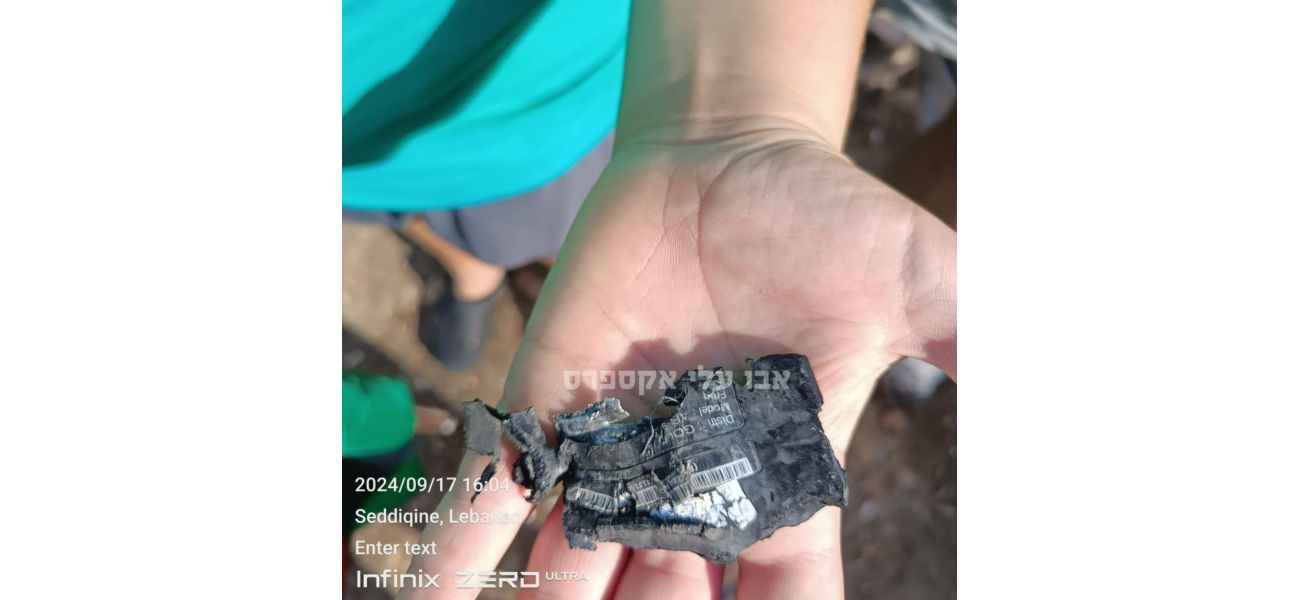Israel allegedly hid explosives in pagers sold to Hezbollah, according to officials.
Lebanese officials say the technology is nearly impossible to detect due to its advanced capabilities.
September 27th 2024.

According to two high-ranking Lebanese security officials, Israel used a clever tactic in their attack on Hezbollah by hiding explosives inside the batteries of pagers that were brought into Lebanon. The officials were amazed by the advanced technology used, which made the explosives virtually undetectable.
As investigations continued into the origin of these wireless communication devices and how they ended up in the hands of Hezbollah members, Lebanese security officials witnessed controlled explosions of some of the weaponized pagers. These officials had a close-up view of the devastating effects the blasts would have had on anyone carrying the devices, as well as those around them.
Last week, thousands of Hezbollah members were targeted by explosions, first through their pagers on Tuesday and then through their walkie-talkies on Wednesday. The attacks resulted in the deaths of at least 37 people, including some innocent bystanders, and injured nearly 3,000 others, according to Lebanese health authorities.
The sudden and unexpected attack caught Hezbollah off guard, as they had been using analogue technologies to avoid Israeli infiltration. While Israel has not directly commented on the attacks, CNN has learned that it was a joint operation between Israel's intelligence service, Mossad, and the Israeli military.
Israel's defense minister, Yoav Gallant, indirectly acknowledged his country's involvement by praising the "excellent achievements" of Mossad and the Shin Bet, Israel's internal security agency. Both Lebanon and Hezbollah have accused Israel of carrying out the attacks.
One of the Lebanese security sources revealed that the explosive material was concealed inside the lithium batteries of the pagers in a highly sophisticated manner, making it nearly impossible to detect. The source did not provide further details on the security checks the devices may have gone through before entering the country.
Another high-ranking official confirmed that he had personally examined one of the compromised pagers and witnessed its controlled explosion. He described the explosive material as being "laced" within the battery and undetectable. He also admitted to never having seen anything like it before.
According to experts, an improvised explosive device typically consists of five components: a power source, an initiator, a detonator, an explosive charge, and a casing. In this case, only a detonator and explosive charge were needed to turn the pagers into weapons, as they already contained the other three components. Sean Moorhouse, a former British Army officer and explosive ordinance disposal expert, suggested that the battery itself may have been modified with an electronic detonator and small explosive charge, making it impossible to detect through imaging technology.
After reviewing footage of the explosions, other experts also concluded that explosive devices were hidden within the pagers, indicating a sophisticated operation involving a state actor. This aligns with the initial assessments made by Lebanese authorities, who sent a letter to the UN Security Council stating that the devices were implanted with explosives before arriving in the country and were tampered with in a professional manner by foreign entities.
Evidence from the aftermath of the attacks pointed to two specific companies involved in the production of the compromised pagers and walkie-talkies – Gold Apollo from Taiwan and ICOM from Japan. However, both companies have denied any involvement in the attacks.
ICOM stated that the walkie-talkie model used was discontinued ten years ago and could not confirm if the devices were counterfeit or shipped from their company. Counterfeit versions of the devices are easily available for purchase on e-commerce websites. The Lebanese communications ministry also confirmed that the walkie-talkies were not officially licensed and were not vetted by security services.
International investigations have focused on Gold Apollo, tracing the production and licensing of the AR-924 model from Taiwan to shell companies, in an effort to determine how the Israeli operation was carried out. According to The New York Times, Israel had set up three shell companies to hide the identities of their intelligence officers involved in the production of the pagers.
Last week, Gold Apollo's chairman and founder, Hsu Ching-kuang, was questioned by Taiwanese prosecutors, but was eventually released. Hsu vehemently denied any involvement in the production of the pagers, claiming instead that they were manufactured by a Hungarian firm, BAC Consulting.
However, Hsu's story was contradicted by a former Gold Apollo employee, Teresa Wu, who was seen leaving the prosecutors' office. Wu had set up a company called Apollo Systems Ltd and was believed to be working for BAC Consulting. It is not clear if she was operating under her own company name in Taipei, but Apollo Systems HK, the company's website, claimed to have a manufacturing and sales hub in Taipei City and a logistics office in Hong Kong.
As investigations continue, it is becoming increasingly apparent that the attacks were a result of a complex and well-orchestrated plan involving multiple countries and companies. The true extent of Israel's involvement and the full details of how they carried out the attacks may never be fully known.
According to two high-ranking Lebanese security officials, Israel used a clever tactic in their recent attack on Hezbollah. They hid explosives inside the batteries of pagers brought into Lebanon, making it almost impossible to detect. The officials even witnessed controlled explosions of some of these weaponized pagers, as they continued their investigation into how these devices ended up in the hands of Hezbollah.
During the explosions, the pagers were switched off, meaning they did not receive the message that triggered the detonation. This gave the officials a front-row seat to the devastation that would have occurred had the devices been activated while being carried by members of Hezbollah. In total, the blasts killed 37 people and injured nearly 3,000, including innocent bystanders.
The attack caught Hezbollah off guard, as they had intentionally avoided using cell phones to prevent Israeli infiltration. While Israel has not directly commented on the attacks, it has been revealed that they were a joint operation between their intelligence service, Mossad, and the military. Israel's defense minister, Yoav Gallant, even praised the success of the operation the day after the pager attack.
But how did Israel manage to sneak these explosive devices into Lebanon without being detected? According to one Lebanese security source, the way the explosives were hidden inside the pager batteries was incredibly sophisticated and virtually undetectable. Another high-ranking source who examined one of the compromised pagers confirmed that the explosive material was "laced" inside the lithium battery and was unlike anything they had ever seen before.
Experts have hypothesized that the explosive devices used in the attack only required a detonator and explosive charge, as the pagers already had the other necessary components. Former British Army officer and explosive ordinance disposal expert Sean Moorhouse suggested that the battery itself may have been modified, with an electronic detonator and small explosive charge implanted inside the metal casing to avoid detection through imaging technology.
Footage of the blasts also supports the theory that the explosive devices were hidden inside the pagers, indicating a sophisticated supply chain attack involving a state actor. This aligns with initial assessments by Lebanese authorities, who found that the devices were implanted with explosives before arriving in the country and were tampered with by foreign entities.
Investigations have led to the discovery that the pagers used in the attacks were made by a Taiwanese company called Gold Apollo and the walkie-talkies were manufactured by a Japanese firm, ICOM. However, both companies have denied involvement in the attacks, suggesting that the devices may have been counterfeits.
Further investigations have revealed a complex network of shell companies and licensing agreements, with some pointing to Israeli intelligence officers as the actual manufacturers of the pagers. The chairman of Gold Apollo, Hsu Ching-kuang, was even questioned by Taiwanese prosecutors, though he claims the pagers were actually made by a Hungarian firm, BAC Consulting.
The former Gold Apollo employee, Teresa Wu, has also been questioned by prosecutors. She has since left the company and started her own, Apollo Systems Ltd, which has connections to a website that was shut down after the attacks. It seems that this supply chain stretches from Taiwan to Hungary, with many unanswered questions about how the explosive devices ended up in the hands of Hezbollah.
As investigations continued into the origin of these wireless communication devices and how they ended up in the hands of Hezbollah members, Lebanese security officials witnessed controlled explosions of some of the weaponized pagers. These officials had a close-up view of the devastating effects the blasts would have had on anyone carrying the devices, as well as those around them.
Last week, thousands of Hezbollah members were targeted by explosions, first through their pagers on Tuesday and then through their walkie-talkies on Wednesday. The attacks resulted in the deaths of at least 37 people, including some innocent bystanders, and injured nearly 3,000 others, according to Lebanese health authorities.
The sudden and unexpected attack caught Hezbollah off guard, as they had been using analogue technologies to avoid Israeli infiltration. While Israel has not directly commented on the attacks, CNN has learned that it was a joint operation between Israel's intelligence service, Mossad, and the Israeli military.
Israel's defense minister, Yoav Gallant, indirectly acknowledged his country's involvement by praising the "excellent achievements" of Mossad and the Shin Bet, Israel's internal security agency. Both Lebanon and Hezbollah have accused Israel of carrying out the attacks.
One of the Lebanese security sources revealed that the explosive material was concealed inside the lithium batteries of the pagers in a highly sophisticated manner, making it nearly impossible to detect. The source did not provide further details on the security checks the devices may have gone through before entering the country.
Another high-ranking official confirmed that he had personally examined one of the compromised pagers and witnessed its controlled explosion. He described the explosive material as being "laced" within the battery and undetectable. He also admitted to never having seen anything like it before.
According to experts, an improvised explosive device typically consists of five components: a power source, an initiator, a detonator, an explosive charge, and a casing. In this case, only a detonator and explosive charge were needed to turn the pagers into weapons, as they already contained the other three components. Sean Moorhouse, a former British Army officer and explosive ordinance disposal expert, suggested that the battery itself may have been modified with an electronic detonator and small explosive charge, making it impossible to detect through imaging technology.
After reviewing footage of the explosions, other experts also concluded that explosive devices were hidden within the pagers, indicating a sophisticated operation involving a state actor. This aligns with the initial assessments made by Lebanese authorities, who sent a letter to the UN Security Council stating that the devices were implanted with explosives before arriving in the country and were tampered with in a professional manner by foreign entities.
Evidence from the aftermath of the attacks pointed to two specific companies involved in the production of the compromised pagers and walkie-talkies – Gold Apollo from Taiwan and ICOM from Japan. However, both companies have denied any involvement in the attacks.
ICOM stated that the walkie-talkie model used was discontinued ten years ago and could not confirm if the devices were counterfeit or shipped from their company. Counterfeit versions of the devices are easily available for purchase on e-commerce websites. The Lebanese communications ministry also confirmed that the walkie-talkies were not officially licensed and were not vetted by security services.
International investigations have focused on Gold Apollo, tracing the production and licensing of the AR-924 model from Taiwan to shell companies, in an effort to determine how the Israeli operation was carried out. According to The New York Times, Israel had set up three shell companies to hide the identities of their intelligence officers involved in the production of the pagers.
Last week, Gold Apollo's chairman and founder, Hsu Ching-kuang, was questioned by Taiwanese prosecutors, but was eventually released. Hsu vehemently denied any involvement in the production of the pagers, claiming instead that they were manufactured by a Hungarian firm, BAC Consulting.
However, Hsu's story was contradicted by a former Gold Apollo employee, Teresa Wu, who was seen leaving the prosecutors' office. Wu had set up a company called Apollo Systems Ltd and was believed to be working for BAC Consulting. It is not clear if she was operating under her own company name in Taipei, but Apollo Systems HK, the company's website, claimed to have a manufacturing and sales hub in Taipei City and a logistics office in Hong Kong.
As investigations continue, it is becoming increasingly apparent that the attacks were a result of a complex and well-orchestrated plan involving multiple countries and companies. The true extent of Israel's involvement and the full details of how they carried out the attacks may never be fully known.
According to two high-ranking Lebanese security officials, Israel used a clever tactic in their recent attack on Hezbollah. They hid explosives inside the batteries of pagers brought into Lebanon, making it almost impossible to detect. The officials even witnessed controlled explosions of some of these weaponized pagers, as they continued their investigation into how these devices ended up in the hands of Hezbollah.
During the explosions, the pagers were switched off, meaning they did not receive the message that triggered the detonation. This gave the officials a front-row seat to the devastation that would have occurred had the devices been activated while being carried by members of Hezbollah. In total, the blasts killed 37 people and injured nearly 3,000, including innocent bystanders.
The attack caught Hezbollah off guard, as they had intentionally avoided using cell phones to prevent Israeli infiltration. While Israel has not directly commented on the attacks, it has been revealed that they were a joint operation between their intelligence service, Mossad, and the military. Israel's defense minister, Yoav Gallant, even praised the success of the operation the day after the pager attack.
But how did Israel manage to sneak these explosive devices into Lebanon without being detected? According to one Lebanese security source, the way the explosives were hidden inside the pager batteries was incredibly sophisticated and virtually undetectable. Another high-ranking source who examined one of the compromised pagers confirmed that the explosive material was "laced" inside the lithium battery and was unlike anything they had ever seen before.
Experts have hypothesized that the explosive devices used in the attack only required a detonator and explosive charge, as the pagers already had the other necessary components. Former British Army officer and explosive ordinance disposal expert Sean Moorhouse suggested that the battery itself may have been modified, with an electronic detonator and small explosive charge implanted inside the metal casing to avoid detection through imaging technology.
Footage of the blasts also supports the theory that the explosive devices were hidden inside the pagers, indicating a sophisticated supply chain attack involving a state actor. This aligns with initial assessments by Lebanese authorities, who found that the devices were implanted with explosives before arriving in the country and were tampered with by foreign entities.
Investigations have led to the discovery that the pagers used in the attacks were made by a Taiwanese company called Gold Apollo and the walkie-talkies were manufactured by a Japanese firm, ICOM. However, both companies have denied involvement in the attacks, suggesting that the devices may have been counterfeits.
Further investigations have revealed a complex network of shell companies and licensing agreements, with some pointing to Israeli intelligence officers as the actual manufacturers of the pagers. The chairman of Gold Apollo, Hsu Ching-kuang, was even questioned by Taiwanese prosecutors, though he claims the pagers were actually made by a Hungarian firm, BAC Consulting.
The former Gold Apollo employee, Teresa Wu, has also been questioned by prosecutors. She has since left the company and started her own, Apollo Systems Ltd, which has connections to a website that was shut down after the attacks. It seems that this supply chain stretches from Taiwan to Hungary, with many unanswered questions about how the explosive devices ended up in the hands of Hezbollah.
[This article has been trending online recently and has been generated with AI. Your feed is customized.]
[Generative AI is experimental.]
0
0
Submit Comment





